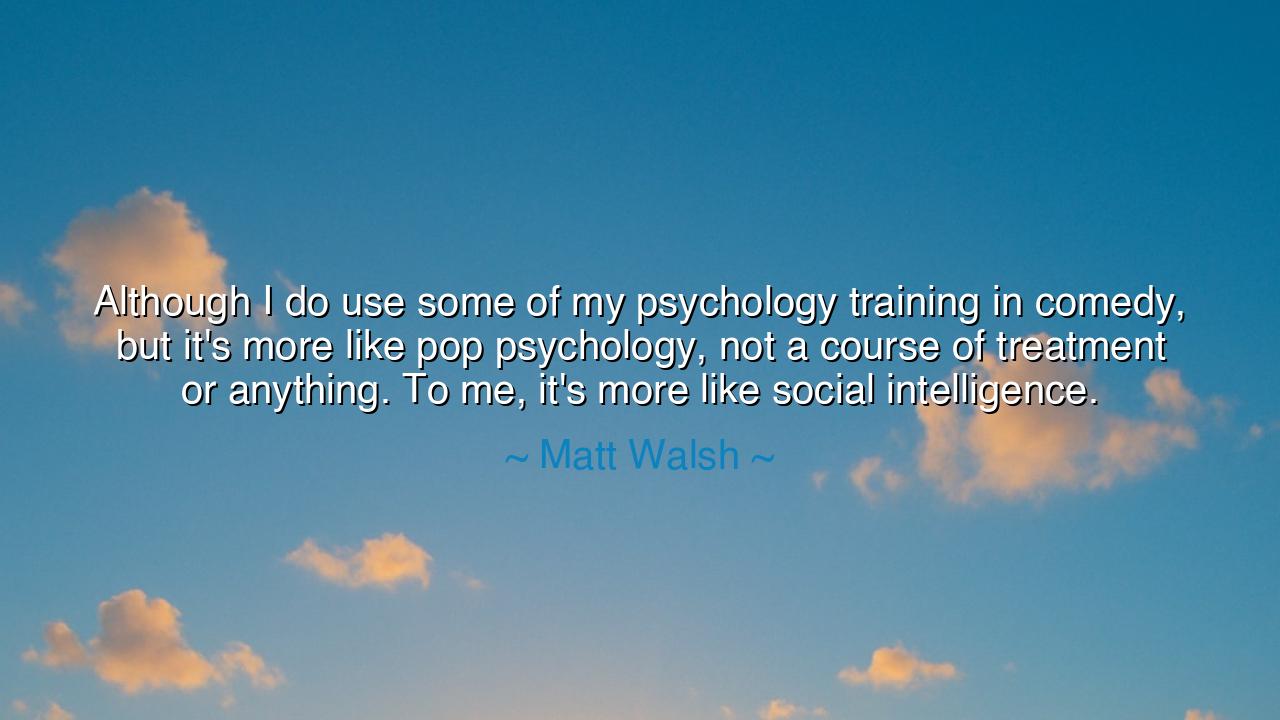
Although I do use some of my psychology training in comedy, but
Although I do use some of my psychology training in comedy, but it's more like pop psychology, not a course of treatment or anything. To me, it's more like social intelligence.






The words of Matt Walsh, comedian and thinker of the human condition, hold within them a quiet wisdom wrapped in humor: “Although I do use some of my psychology training in comedy, but it’s more like pop psychology, not a course of treatment or anything. To me, it’s more like social intelligence.” In these words, he reveals a truth not only about his craft but about the very essence of understanding people. For comedy, like life itself, is born from the art of perception—the ability to see into the heart of others, to read their fears, their follies, and their secret hopes. Walsh, trained in psychology, does not use it to heal minds upon the couch of the therapist, but to awaken minds through laughter, insight, and the delicate power of connection.
To understand his words, one must first understand the soul of comedy. True comedy is not cruelty; it is compassion in disguise. The comic, like the sage of old, studies human behavior not to judge it but to reflect it, to hold up a mirror in which the audience may see themselves and smile. When Walsh speaks of using “social intelligence,” he points to this ancient power—the capacity to sense the rhythms of others’ emotions, to know when to jest and when to be still, to transform awkwardness into belonging. The comedian and the psychologist share the same pursuit: to understand what moves people. But where the psychologist dissects, the comedian illuminates, turning truth into laughter and recognition into healing.
In this way, Walsh’s insight is as old as philosophy itself. In ancient Athens, Socrates walked among the people, questioning them with gentle irony, using humor and logic to awaken truth. His dialogues, filled with wit and irony, were acts of social intelligence—he understood that laughter disarms the ego, that a well-placed jest can reach the soul where lectures cannot. Walsh, standing on the modern stage, continues this lineage of the wise fool, who through apparent jest reveals the wisdom of the heart. For laughter, when born of insight, is a teacher more profound than fear or authority. It is the sound of recognition—the moment when truth ceases to threaten and begins to set us free.
And yet, in Walsh’s humility lies another lesson: that his use of psychology is not “a course of treatment,” but rather an act of understanding. This distinction reminds us that wisdom need not always take the form of instruction or cure. Sometimes, to heal is simply to listen, to empathize, to create a moment of shared humanity. When a crowd laughs together, they are no longer strangers—they are a single organism of feeling and release. This, too, is social intelligence at work: the instinct to sense what unites rather than divides, to use the subtle tools of observation and empathy to create harmony where there was distance.
Consider the story of Charlie Chaplin, who, in the silent age of film, used nothing but movement and expression to capture the human condition. His characters were clowns and vagabonds, yet through them he spoke of poverty, pride, love, and injustice. He, too, used psychology—not from textbooks, but from the streets. He understood emotion as the universal language. His comedy was not an escape from suffering; it was a way of transforming it. In this, he embodied exactly what Walsh calls “pop psychology”—a living, breathing understanding of people that brings wisdom down from the clouds and into the common life of humankind.
From Walsh’s reflection, we learn that the truest form of intelligence is not abstract, but relational. To know oneself is wisdom; to know others is greatness. The power to navigate emotion, to read the silent cues of another’s heart, to adapt one’s words and tone so that understanding may blossom—this is the art of social intelligence. It is what makes friendship flourish, leadership endure, and laughter heal. And in a world that prizes data over empathy, it is perhaps the rarest and most essential form of wisdom.
Therefore, O listener, take this teaching to heart: cultivate your own social intelligence. Listen not only to what is said, but to what is meant. Observe not merely the surface of people’s actions, but the tides of feeling beneath them. In conversation, seek not to win, but to connect; in laughter, seek not mockery, but unity. As Matt Walsh reminds us, knowledge alone is not enough—it is understanding, compassion, and timing that give wisdom its true power.
And so, whether you stand before a crowd, speak to a friend, or guide another through hardship, remember this ancient law: the greatest minds do not conquer—they connect. The greatest hearts do not cure—they understand. And those who master the subtle art of empathy and humor, as Walsh describes, become healers of the soul in a way far beyond textbooks or theories. For social intelligence, born of awareness and love, is the bridge between minds, the melody between hearts, and the unseen language that binds the world together.






AAdministratorAdministrator
Welcome, honored guests. Please leave a comment, we will respond soon